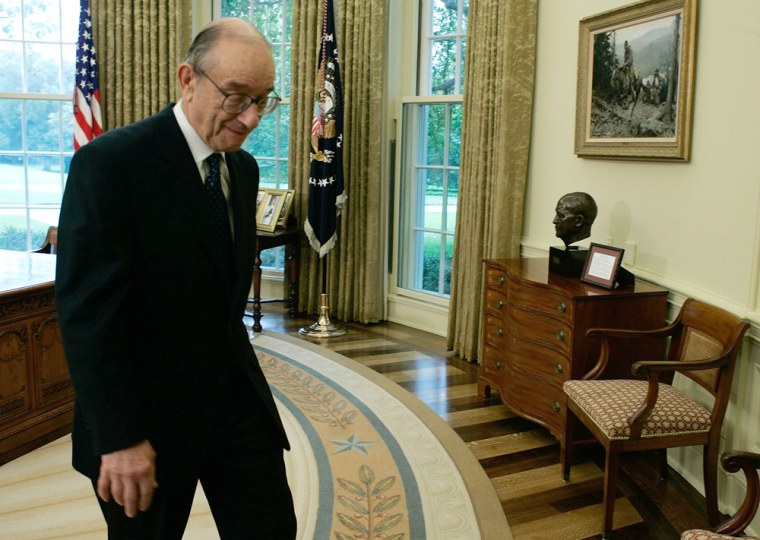Alan Greenspan has been indisputably one of the most important men in American economic life over the last two decades.
Greenspan was a superstar Fed chairman for a media age, dubbed the “maestro.” He appeared on books and magazine covers, and his walks into the Fed on rate-setting meeting days were treated like a celebrity star turn.
Greenspan was appointed Fed chairman by Ronald Reagan in 1987, and almost immediately faced his biggest crisis. On Oct. 19, panic broke out on Wall Street: The Dow Jones industrial average plummeted 537 points -- a bigger percentage drop than the Great Crash of 1929. The financial system came perilously close to collapse, but Greenspan and New York Federal Reserve Bank Chairman E. Gerald Corrigan put out this statement:
"The Federal Reserve, consistent with its responsibilities as the nation's central bank, affirmed today its readiness to serve as a source of liquidity to support the economic and financial system."
That one-sentence statement promised to pump money into the system as needed. Greenspan worked to phones, calling the biggest players in the nation’s financial institutions. The market regained confidence, and rallied. Greenspan was given much of the credit.
He was re-nominated by presidents George H.W. Bush and Bill Clinton, and carefully fine-tuned fiscal policy through the long 1990's stock-market boom.
In 1996, with equities markets climbing in the midst of the tech boom, Greenspan uttered a phrase which has entered the American language: "How do we know when irrational exuberance has unduly escalated asset values?"
In 1998, Russia defaulted on its debts and the huge hedge fund Long-Term Capital Management went belly up -- sparking market panic and fears a chain reaction could rupture the global financial system.
The Fed organized a controversial bailout by private banks, and fired off two quick rate cuts.
That calmed the markets, but 2 years later, as the 21st century dawned, the tech boom went bust. Then came the 9/11 atrocities, which deeply wounded the economy. Greenspan responded by cutting rates to their lowest level in decades, and keeping them there until growth began to return.
"The 1998 liquidity crisis and the crises associated with the stock market crash of 1987 and the terrorism of September 2001 prompted the type of massive ease that has been the historic mandate of a central bank," Greenspan said.
Recently, speaking to schoolchildren in Washington D.C., Greenspan was in a reflective mood: "I’ve been through an awful lot, but I remember when I was your age, and I will tell you, it’s been a great ride."
And as his career as Fed chairman comes to an end, Greenspan set a high standard that his successor will be measured against.
